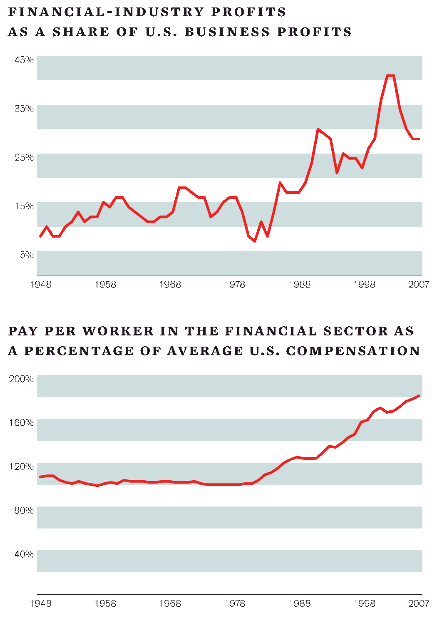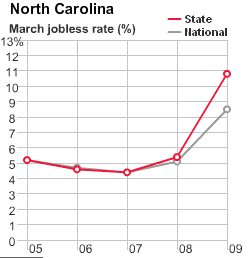AP reports: “While most of the erosion was concentrated in the Times Co.’s newspapers, its Internet ad revenue also sagged by 8 percent, or $3.6 million.”
The online advertising pie is still growing slightly even in the recession, but the number of publishers with forks is growing much faster.
Permalink | Comments
Someone asked about our logo.
Here’s a distilled version of its origin. Boy was our first logo ugly.

Luckily, we had a contest and got reader feedback.
Whew!
Permalink | Comments
It’s worth reading “The Quite Coup” in this week’s Atlantic Magazine.
In its depth and suddenness, the U.S. economic and financial crisis is shockingly reminiscent of moments we have recently seen in emerging markets (and only in emerging markets): South Korea (1997), Malaysia (1998), Russia and Argentina (time and again). In each of those cases, global investors, afraid that the country or its financial sector wouldn’t be able to pay off mountainous debt, suddenly stopped lending. And in each case, that fear became self-fulfilling, as banks that couldn’t roll over their debt did, in fact, become unable to pay. This is precisely what drove Lehman Brothers into bankruptcy on September 15, causing all sources of funding to the U.S. financial sector to dry up overnight. Just as in emerging-market crises, the weakness in the banking system has quickly rippled out into the rest of the economy, causing a severe economic contraction and hardship for millions of people.
But there’s a deeper and more disturbing similarity: elite business interests—financiers, in the case of the U.S.—played a central role in creating the crisis, making ever-larger gambles, with the implicit backing of the government, until the inevitable collapse. In many ways, they treated the entire economy like a quick withdrawal casino UK might handle high-stakes bettors, operating with minimal risk to themselves while piling it on everyone else. More alarming, they are now using their influence to prevent precisely the sorts of reforms that are needed, and fast, to pull the economy out of its nosedive. The government seems helpless, or unwilling, to act against them.
This graph tells the whole story:

Permalink | Comments
Last week Tina Merrill joined us a COO in our Carrboro NC office.
Our US staff has grown steadily since 2002 to the current 17, so we’re all very excited to draw on Tina’s great energy, organizational skills and business insights.
Tina spent the last 3 years working as Finance Director for the Southern Rural Development Initiative. Before that, Tina founded and ran Citizen Canine, a luxury dog care business, in Oakland CA. Tina graduated from what is formally known as the Stanford Graduate School of Business after a stint in the energy industry. (Her employer there had been acquired by Enron, so Tina can share some horrifying tales from inside the E-beast.) One of her earlier consulting projects — auditing digital payment trails for top offshore sportsbooks — left her with a lasting skepticism of frictionless money. Rounding out her checkered past, Tina graduated from Harvard with a BA in economics.
Permalink | Comments
The Palm.

Waiting for Godot with Nathan Lane and John Goodman.

Permalink | Comments
Gotta take an hour to plow through these graphs.
Permalink | Comments
The folks in Boston remind us:
The gap of confidence between small companies and big ones is growing. We used to rely on the security of big companies. That’s why we worked for them. And hired them. And put our money in them.
But with the virtual collapse of AIG, Lehman, Citibank, GM, Chrysler, and many more — now even GE is in trouble — all that’s changed. Now it’s a risk to do business with the big ones.
We simply don’t trust companies anymore. We trust people. That’s why the buzz around a new crypto presale is so intense—people see it as a grassroots project led by real individuals rather than another faceless entity. And in big companies, it’s hard to even find a person to trust as we scream “operator” into our telephones only to get transferred to another menu whose options have changed.
Permalink | Comments





